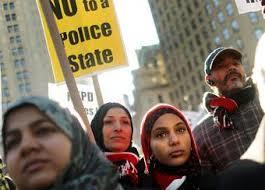NYPD Legalized Surveillance Worries Muslims

“I mean, I don’t really understand the rationale for coming here, out of all places,” Clarkson University junior Saira Bakshi told North Country Public Radio.
According to an Associated Press report in 2012, NYPD investigated mosques and entire ethnic communities as well as Muslim student associations in more than 15 universities.
Though Saira was not in Potsdam in 2012, she was a member of the Muslim Students’ Association at Rutgers University in New Jersey.
“It’s about 3,000 students, which is like the size of Clarkson itself,” she said.
“So, it was a very active group, but I find it so strange that they would think it was any kind of hot spot for radical political movements or planning, because, it was mainly just to preserve our identity as American Muslims.”
For the young Muslim girl, NYPD policies were playing into a common misconception about her religion.
“It’s just that link between religiosity and extremism,” she said.
“It baffles me, because in my experience, everyone I’ve met who is really practicing as an American Muslim repels that whole terrorism aspect. There’s no basis for it in our faith.”
At the end of February, US District Judge William Martini dismissed a lawsuit brought by eight Muslims who said the NYPD was spying on innocent people in mosques, restaurants and schools for more than a decade.
Martini said the plaintiffs weren’t just targeted for their religion.
“The more likely explanation for the surveillance was to locate budding terrorist conspiracies,” he said in his ruling.
“The police could not have monitored New Jersey for Muslim terrorist activities without monitoring the Muslim community itself.”
Since 9/11, Muslims, estimated between six to seven million, have become sensitized to an erosion of their civil rights, with a prevailing belief that America was stigmatizing their faith.
Muslims’ anger has grown against the New York police following revelations in 2011 by the Associated Press that the NYPD used undercover agents to spy on Muslim communities.
A report by the AP said that the NYPD sent out undercover officers into ethnic communities to track daily life and monitor mosques as well as Muslim student organizations.
New Troubles
After the ruling, Saira Bakshi wonders about the nature of the relation between Muslims and NYPD.
“So even though this does set a precedent for other rulings, I doubt that it will go uncontested,” Bakshi said.
“You don’t want this kind of fear that’s being propagated being spread to Muslims too. Because I don’t think Muslims have anything to hide. And it’s really important that our voices aren’t suppressed in all of this.”
Other Potsdam Muslims shared similar concerns.
“Nobody that I know of in my community has experienced adversity. But I’m very aware of what’s out there,” Tarik Maatallah, the president of the mosque in Potsdam, said.
Darby Morrisroe, professor of Government at St Lawrence University, has also questioned the troubling policy of NYPD.
“The NYPD is arguing that in order to be aware of terrorist networks, etcetera, that they have to become deeply familiar with all of these Muslim communities, organizations, and groups, so that if something were to happen, they would be sufficiently familiar with these groups, organizations, and individuals,” she said.
“And I think that approach is problematic, because what it then suggests, is that police can deeply and consistently surveil a community based on a particular demographic characteristic of that community,” she said.
In 2011, the New York University's Center for Human Rights and Global Justice issued a report criticizing the tactic of US law enforcement agencies in sending paid informants into mosques to instigate and trap Muslims into terror plots.
The report, themed “Targeted and Entrapped: Manufacturing the ‘Homegrown Threat’, cited three high-profile domestic terrorism prosecutions which raised question marks about the role of the FBI and the NYPD in creating the perception of “homegrown” terrorism.
Source: On Islam



